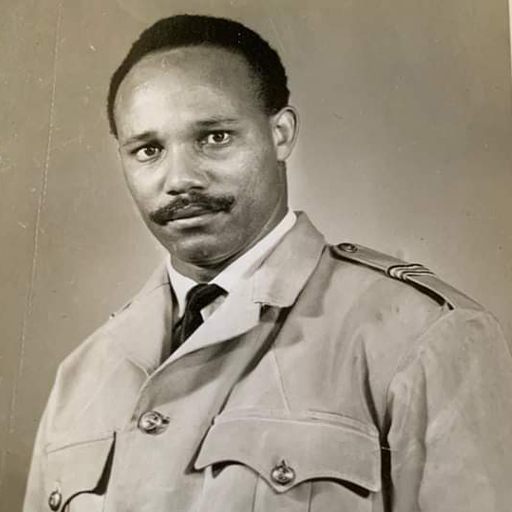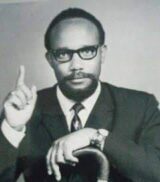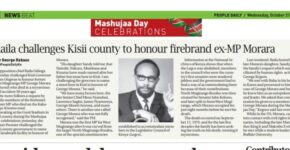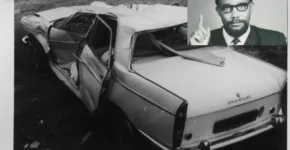54 Years Later – We Delve Into The Story

Having represented West Mugirango as a Member of Parliament for nine months, George Justus Morara’s legacy is now being honored more than fifty years after his passing. Morara, a charismatic and up-and-coming politician, tragically lost his life in a suspicious car accident in September 1970.
During his campaign, Morara popularized the symbol of Egesora Nyabirore, commonly known as a spectacled dragon, a name that strongly connected with the electorate. While Morara may not be a household name nationally, his influence is deeply rooted in the Gusii region, with his name prevalent across villages and clans in Nyamira and Kisii counties.
Only two days before his death, Morara had demanded that the government reveal the truth about who was responsible for the assassination of Tom Mboya, a cabinet minister killed in downtown Nairobi. There were concerns that the conviction of Mboya’s assassin was being concealed, but Morara stated that he had spotted the suspect while in Zambia.
Morara quickly gained popularity before his untimely death, which was never fully examined. Many boys born shortly after and in the years following his passing were given his name.
Similar to numerous African societies, the naming of children was a complex procedure, yet there were names that went beyond sub-clan and lineage distinctions. It was documented that Morara passed away in a traffic accident while returning to Kisii from Kakamega.
Reportedly, he collided head-on with a police land rover traveling in the opposite direction on the winding roads of Nandi Hills as they descended towards the plains. At that time, he held the position of Chair of the Public Accounts Committee in Parliament.
He attended a work-related meeting in Kakamega. His family continues to grapple with the puzzling death of their patriarch, a rising figure in the community and at the national level. The circumstances surrounding his passing remain a mystery.
THE HOME
The Late George Justus Morara Hailed from Gesore on the outskirts of Nyamira Town, just a stone’s throw away from the well-known Konate junction along Kisii-Chemosit Road. Konate is the local dialect’s term for Corner-T.
The area has produced notable figures such as the late independence Senator George Kebaso and Senator Mong’are Bwokong’o (who served from 2013 to 2017). Prominent individuals like retired Chief Justice David Maraga, former athlete Tom Nyariki, the late first governor of Nyamira John Nyagarama, among others, also originate from this region.
Dr. Matunda Nyanchama of Nsemia Publishers mentioned that in addition to Morara’s efforts in advocating for the construction of the Kisii-Chemosit Road (which was eventually completed during the NARC regime), he also championed for the elevation of Nyamira Division to sub-district status.
The status elevation occurred during the 1990s, leading to the establishment of Nyamira County. This development brought about Nyamira District Hospital, now a referral facility, and the Nyamira Water Project, benefiting the residents of Nyamira and its environs.
Alfred Nyagaka Nyamwange, an educator and the author of The Blood Stains, highlights the enduring impact of Morara’s advocacy efforts, despite his untimely passing in 1970. Nyamwange reminisces about the challenging journey from Nyamira to Kisii in the mid-90s, characterized by a meandering, lengthy, and muddy route.
He recounts the difficulties faced by women travelers who paid more for transportation as men frequently had to assist in pushing vehicles stuck in the mud, resulting in arduous and dirty trips. Reflecting on the lack of progress in the region, particularly in essential infrastructure and higher education institutions, Dr. Matunda praises Morara as a forward-thinking leader who made a significant impact during his brief tenure.
Dr. Matunda suggests that naming a road or public facility after Morara would be a fitting tribute to his legacy. Furthermore, Dr. Matunda recalls Morara’s associations with influential figures like JM Kariuki and GG Mutiso, who faced challenges with the government at the time.
He acknowledges JM’s contributions to education infrastructure, emphasizing the importance of understanding history to shape the present and future. Prof. Herman Kiriama of Kisii University underscores Morara’s initiative in proposing a motion for the government to establish a technology institute in each district, a proposal that influenced the establishment of institutions like Kisii National Polytechnic, formerly known as Gusii Institute of Technology (GIT), in Kisii.
The Year 1970

As he sipped his drink one late evening in Lusaka, Zambia, in early September 1970, West Mugirango MP George Justus Morara bumped into Nahashon Isaac Njenga Njoroge – the man who assassinated Constitutional Affairs Minister, Tom Mboya, on July 5, 1969.
An astonished Morara, who was among members of the Social Welfare and Employment parliamentary committee on official duty, confronted Njenga who, in panic, bolted out of the club. The government had announced the previous year that Njenga had been sentenced to death and hanged for shooting dead the powerful Cabinet minister along Nairobi’s Government Road (present-day Moi Avenue).
Upon arrival at Nairobi’s Embakasi Airport, Morara and a few members of the House team, chaired by Kandara MP George Mwicigi, headed to Parliament buildings for a scheduled press conference.
Without mincing words, Morara spilled the beans on the group’s encounter with Njenga in Lusaka, and gave the Government a 48-hour ultimatum to produce the Bulgarian-trained Njenga.
Forty-eight hours later, the MP was dead — killed in a suspicious road accident along the Kakamega-Kisumu highway. He was only 34 years old and was seen as one of the most promising politicians — even mentioned as a possible future president.
To date the fiery politician’s death remains a mystery. While friends and family maintain he was assassinated by President Jomo Kenyatta’s state agents as part of a wider cover-up scheme of the assassination of Mboya, others believe it was an unfortunate accident.
In his condolence message on the evening of Saturday, September 12, 1970 – the day Morara died – Mzee Kenyatta said: “I have learnt with great sorrow of the untimely death of Mr Morara, who had kicked off his political career with vigour and vitality. Within a short time he had clearly shown his interest and ability to serve the nation and had contributed greatly through Parliament and extensive tours throughout the republic.”
Describing him as straight-talking and a thorn in the flesh of the government, Mr Benson Kegoro, who succeeded Morara as West-Mugirango MP in a subsequent by-election, observes that his predecessor had a singular determination to serve the people.
“We have no idea what exactly happened. He may have died in a road accident as stated or someone might have plotted to silence him owing to his consistent criticism of the government,” the former MP told Sunday Nation this week.
The politician’s wife died in India in October 2010 over heart-related complications. The second born, Duke, fled the country fearing for his life following repeated protests to the government over his father’s alleged assassination.
Speaking during his charged burial ceremony on September 17, 1970, attended by Speaker of National Assembly Fred Mati, six Cabinet ministers and several MPs, Public Works minister James Nyamweya summarised it aptly by stating that Morara “was born a fearless and courageous fighter whose main interest in life was to fight for justice of all people”.
When indeed he made his maiden speech in Parliament in February 1970, Morara kicked off with bold observations on President Kenyatta: “Mr Speaker, I would like to make my maiden speech by making this point. His Excellency has an exceptionally good personality. However, he is being misguided and misled and being misadvised by some individuals who otherwise want to get the best of the national cake. And as a result the rest of the country suffers”.
And for the rest of the short stint in Parliament, the West Mugirango MP never shied away from criticising the government or publicly asking the Head of State to put his house in order. In one of the Hansard reports, he is quoted protesting at the government’s failure to address tribal conflicts.
“Right now while we are speaking in this House, Mr Speaker, some people are dying. There are daylight robberies, there are daylight raids of cattle and people are being killed. When they kill one, we kill 20. However this is nothing to be proud of. How can we live in peace when something is said in this House and nothing is done? The credibility and dignity of government have been challenged,” he protested at Deputy Speaker, Dr Munyua Waiyaki.
Morara’s sentiments may sound harmless and common place today, but at the time only a handful of politicians — including J.M Kariuki, Mark Mwithaga, Martin Shikuku among others — dared to challenge the President and his administration.
Former Commerce and Industry minister, James Nakhwanga Osogo, for instance, remembers Morara as a firebrand who was eloquent in articulating his position. When he passed on, a grieving Osogo pointed out that Parliament would greatly miss his “fiery speeches”.
Born in 1936 in a small village of Nyakeore in West Mugirango, in the current Nyamira County, Morara attended Sironga and Kamagambo primary schools before joining Kisii High School.
He later proceeded to Buffalo University, Michigan, US, and upon his return in 1964, served in the civil service as a District Officer in various stations including Kisumu, Maseno, Homa Bay, Eldama Ravine and Maralal. He later quit government and worked briefly at BP/Shell at a senior level before resigning to venture into politics.
On the day he met his death, Morara is said to have been in the company of parliamentary colleagues Mark Bosire (Kitutu Masaba) and Nyarangi Moturi (North Mugirango). The trio reportedly left Nairobi for upcountry in Morara’s car, with his colleagues alighting (after a brief argument) in Nakuru.
Morara proceeded alone to Kakamega for official duty, including a meeting with his friend, Kakamega District Commissioner Ezekiel Nyarangi.
A street in Nakuru is named after him






